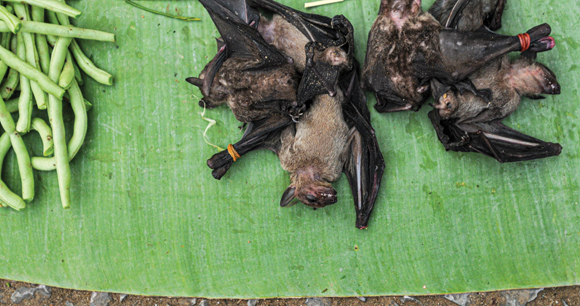Preventing Future Pandemics Act
One of the stark realities COVID-19 has forced us to confront is the huge risk posed by zoonotic diseases—pathogens passed from nonhuman animals to humans. COVID is merely the latest and most devastating example of this type of disease. In the past 40 years, the worst pandemics and epidemics—including SARS, Ebola, HIV/AIDS, avian flu, swine flu, and Zika—have all originated in animals. We must reevaluate our treatment of animals and our relationship with the natural world in order to protect public health.

In September, Senators John Cornyn (R-TX) and Cory Booker (D-NJ) and Representatives Mike Quigley (D-IL) and Fred Upton (R-MI) introduced the Preventing Future Pandemics Act (HR 8433/S 4749). This bill would outlaw the import, export, and sale of live wildlife for human consumption in the United States. It would also provide support for efforts to help curb wildlife trade for human consumption abroad.
The United States is responsible for an estimated 20 percent of the global wildlife trade. Live wildlife markets, the primary focus of this bill, constitute just one segment of this multibillion-dollar trade, yet COVID-19 has taught us that they can have serious repercussions for public health. At such markets, wild animals such as civets and bats are crammed together near humans, creating an ideal scenario for the spillover of diseases to which we have no immunity.
By exploiting animals and their habitats, we contribute to precipitous declines in biodiversity and come into more frequent contact with wildlife that carry novel and dangerous pathogens. AWI will continue advocating for the Preventing Future Pandemics Act to position the United States as a global leader in protecting both wildlife and public health.
Program Terms: Terrestrial Wildlife
AWI Quarterly Terms: Government/Legal, Quick Read
Related News
IUCN Reaffirms Long-Tailed Macaques’ Endangered Status Despite Industry Pressure
In Program: Terrestrial WildlifeThe International Union for Conservation of Nature (IUCN) today released an update to its Red List of Threatened Species. The update revealed that the long-tailed...
AWI Funds Research to Alleviate Human-Wildlife Conflicts, Animal Suffering
In Program: Terrestrial WildlifeThe Animal Welfare Institute (AWI) announced today the eight recipients of its Christine Stevens Wildlife Award who are developing humane solutions to human-wildlife conflicts and...
Refuge from Cruel Trapping Act Reintroduced to Protect Wildlife and Pets on Public Lands
In Program: Companion Animals, Terrestrial WildlifeThe Animal Welfare Institute (AWI) endorses the Refuge from Cruel Trapping Act, reintroduced today in the US House of Representatives by Rep. Jerrold Nadler (D-NY)....
Colorado Now Leads Country in Comprehensive Approach to Fighting Wildlife Trafficking
In Program: Terrestrial WildlifeToday, Colorado Gov. Jared Polis signed S.B. 25-168 into law to combat wildlife trafficking. The bipartisan legislation, which is unique among states for the number...